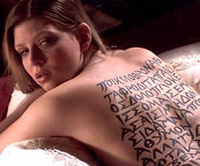













![]()
Interview with Amber Benson
Dec 7, 2003, Offenbach
2. Movies, television and the family
3. Being in control
4. "Chance", Sex and Power
5. The Technicalities of Being Inspired
6. Reading, Collaborating, Watching & Listening
Let’s talk about magic – not Tara’s magic but Chance’s. Anne Sexton said that people are "magic talking to itself". Even agnostics can find that a perfectly reasonable thing to say for an artist – and in your film, although it certainly isn’t overt fantasy, there are a lot of glimpses of this condition: the mesmerism of tofu cheese, the counting of stars on the ceiling, the power of Shakespeare’s lines to reunite an odd couple. How much of this sort of magical realism is realism to you, how much of it is magic?
I choose to live my life with the idea that this sort of ‘magical realism’, if you wish to call it that, is true: magic is out there in some capacity, maybe not as in casting a spell per se but some sort of ability to impact on other people and how you affect change in the world. I grew up reading things like Gabriel Garcia Marquez: you walk in there, it’s real but there’s the element of "what if?". We leave that open, the ‘what if’s. Physics talks about this idea that you have all these worlds on top of each other and everything coexists at the same time. I think that applies in our lives: it all exists, we just have to tap into what we want to tap into.
A story like that may be true even when it’s not actual.
It may not be actual but it’s never false.
Harlan Ellison keeps saying: no good film was ever made from a bad script. Having done "Buffy, the Vampire Slayer" which is certainly as writer-centric a visual enterprise as they come (and all the more brilliant for it), who calls the shots in your inner studio – the writer, the director, the actress? Does it switch, is it multitasking?
(Noise from nearby)
It is kind of multi-… it’s hard to concentrate here, my brain is in five different places as it is. Well, coming from Buffy… of course that is very writer-oriented, and there I spent a lot of time hanging out with the writers, with Joss and Marti Noxon, just because I was so intrigued by their brains and how they worked. Joss especially, I mean he’s a very talented fellow. You know it’s a Joss-script when it has this kind of intuitiveness, when’s it’s crazy and interesting: you’re reading it and…
You don’t know what’s going to happen.
Exactly. You feel like it’s happening, it’s as real as possible even if you have all these vampires and magic. It just feels like it could actually happen, because it has this intuitiveness about the human condition. But for me… I get on the set and I’ve written this thing and I’ like to bring as much of what was written to the actual set dealing with actors and crew-people and such, but I find that if you’re not open to compromise and listening to other people you lose a lot. And I think that’s what’s good about “Buffy”: even if Joss was the one who knew what would happen, he still was open to input.
From the actors even?
Everybody. It was an open place. We did go to his house when it was weekend, you know, reading Shakespeare, that kind of stuff. He’d take things you said to him in conversation and put them into the script sometimes, it was very odd.
Just with the character you were supposed to play or...
All the characters, all over the place.
> back to top
> Part 2


